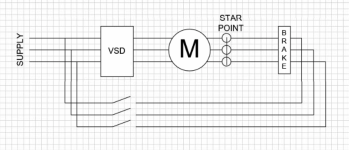lostcontrol
Lifetime Supporting Member
OP
No, but tested out the motor etc & no issues identified.Have you tested for any connection between the brake and the motor wiring?
Yes, 3p brake for sure. Existing installation, no obvious changes & the brake works ok electrically, as does the motor when the brake is manually releasedThe star points haven't accidentally been tied together? Assuming 3Ø brake.










